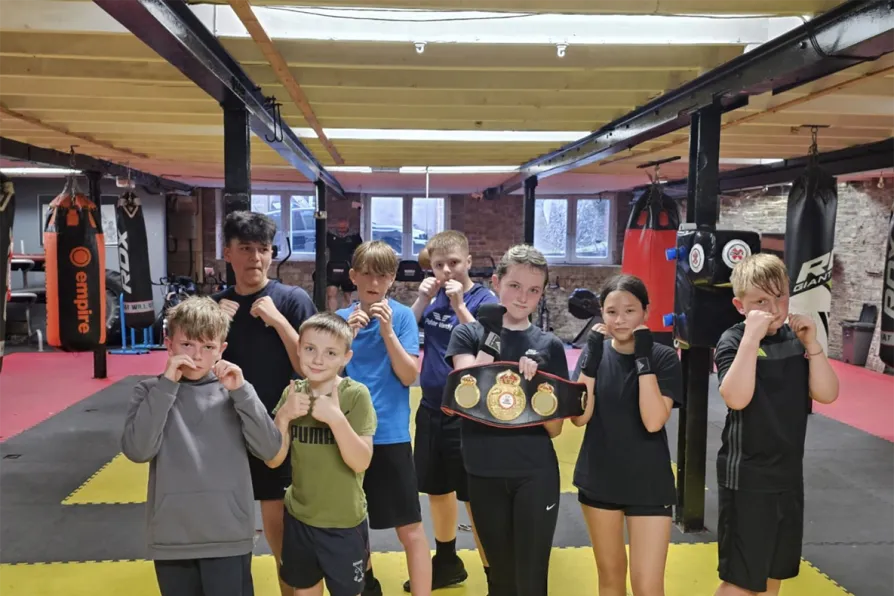In a town shaped by hardship and history, a grassroots boxing club led by Andrew McFarlane gives purpose to the next generation — including a rising champion, writes JOHN WIGHT

 Young boxers at Hawick Boxing Club, October 2025
Young boxers at Hawick Boxing Club, October 2025
MOST readers of this column will not be familiar with the Scottish Borders town of Hawick. Lying almost equidistant between Edinburgh to the north and Newcastle to the south, this is lamentable as Hawick has to its name some notable historic events.
The most celebrated of those is the 1514 Battle of Hornshole, when English soldiers in the year after the greatest defeat of Scottish arms against same in the 1513 Battle of Flodden, arrived on the outskirts of Hawick with pillage and destruction in mind. The flower of Scottish manhood had perished at Flodden, leaving Scottish Borders towns such as Hawick undefended and vulnerable to attack. Word reached the townsfolk of Hawick of their presence, the alarm was raised, and the youths of the town armed themselves with an array of crude weapons and set out to challenge them.
The result was the English party being routed and the Scots taking their pennant, which they proudly flew through the town upon their return on horseback. The event is celebrated each year in June in an event known as the Common Riding.
Hawick, today, is the rough and ready product of post-industrialisation. In its pomp the town was a major hub of the UK textile industry, employing thousands of men and women. With this industry largely gone, today its high street is a place of charity shops, coffee shops, vape shops and Turkish and Kurdish barber shops. It is, in sum, the same high street setting found in such small times all over these islands.
Amid such economic turbulence, amateur boxing clubs take on even more importance. The young boy and girls who inhabit them are introduced to the virtues of fitness, self-discipline, respect, and the exhilaration offered by the most maligned sport there is, but also arguably the most important. It is there that they are introduced to adult role models, and it is there where they experience positive self-reinforcement on the regular. Overall, in these days of mental health awareness, amateur boxing clubs have never been more necessary.
It is why is was such a pleasure to sit down for coffee recently with the current custodian of Hawick Boxing Club, Andrew McFarlane. Andrew, it should be noted, manages the club on a voluntary basis. At age 59, his full time job as a rail conductor sees him travel far and wide, while his passion for the boxing club sees him travel even more, regularly ferrying young fighters to tournaments and training and sparring sessions whenever required.
Andrew: “We [Hawick Boxing Club] take sixty kids off the streets every week. We host free training sessions for ex-forces, blue light workers, and people suffering with mental health issues. We also do sessions with the high school kids, again free of charge.”
It is impossible to argue against the social good that amateur clubs such as Hawick do in towns and cities everywhere. Kids, predominately but not solely from working-class backgrounds, have been among the hardest hit by local council budget cuts. It is why it remains incomprehensible that amateur boxing clubs are not widely viewed as community projects, deserving of charitable status.
Andrew: “We are currently looking for new premises, after a disagreement with our current landlord over the monthly rent made staying where we are impossible. The support from the people in the town has been overwhelming in this regard. But it has been tough.”
Though the central purpose of any amateur boxing club is to develop young people into responsible adults, developing skills and virtues that can be utilised in every other aspect of life, they are also laboratories where at times champions and elite athletes are forged.
When it comes to Hawick Boxing Club, Rosie Swailes is one such champion. At age 16, she has already won the Scottish championship twice, the British championship three times, and is the current holder of both titles. In addition to that, she is a former Eastern district champion and the six time winner of mini-tournament Box Cup tournaments. This is a remarkable feat for a young boxer her age.
In a recent Facebook post, Rosie had this to say about the role of Hawick Boxing Club in her life to date: “When I first walked through the doors I was overweight, unfit, and not sure if I’d even stick it out. What mattered was that I was welcomed, encouraged, and pushed to keep going. Over the years, I’ve trained hard, learned discipline, built confidence, and made progress I never thought possible.”
As a current member of the Scottish Boxing team, Rosie’s daily routine is nothing short of Herculean. It involves her travelling to Glasgow from Hawick to train at the Boxing Scotland’s high-performance centre in Glasgow, there and back, five days a week. This translates to a bus and two train journeys there and back.
Andrew: “Rosie’s dedication is remarkable for a person her age. She sacrifices so much in pursuit of her dream, which is to fight as a professional. She’s an inspiration to the other kids and living proof of what can be achieved with hard work and discipline.”
If only there were more not less Hawick Boxing Clubs in our world, and if only there were more people like Andrew McFarlane. Both stand as living proof that what truly matters in life cannot be measured in pounds and pence alone.









